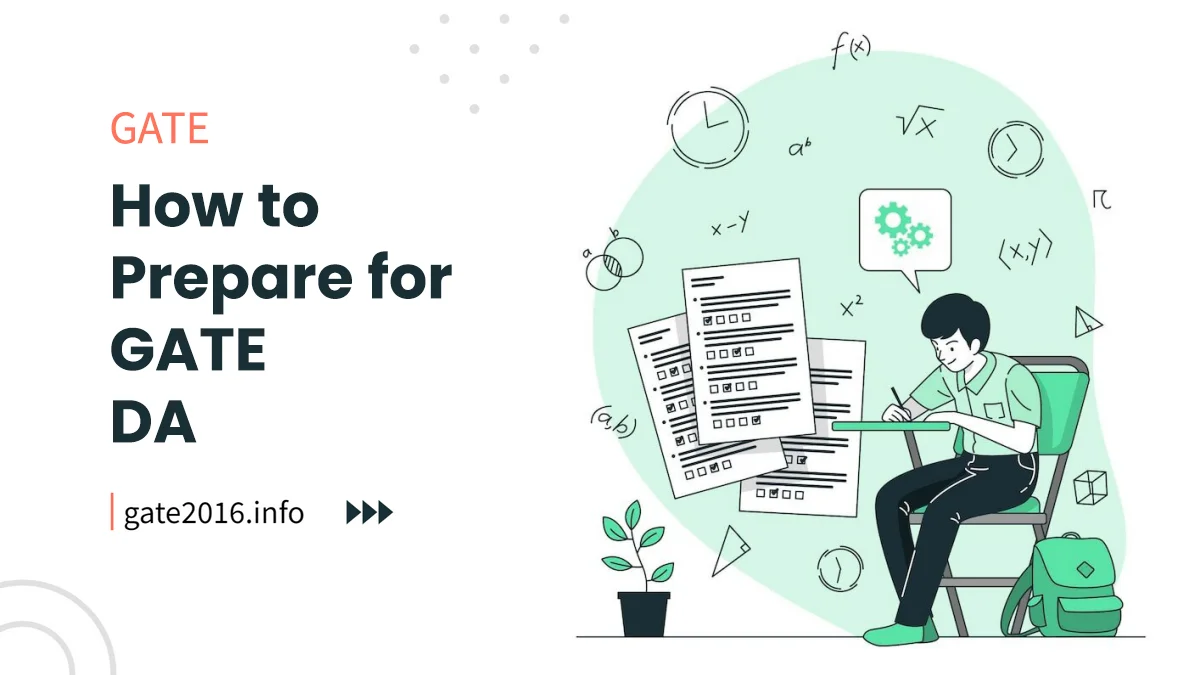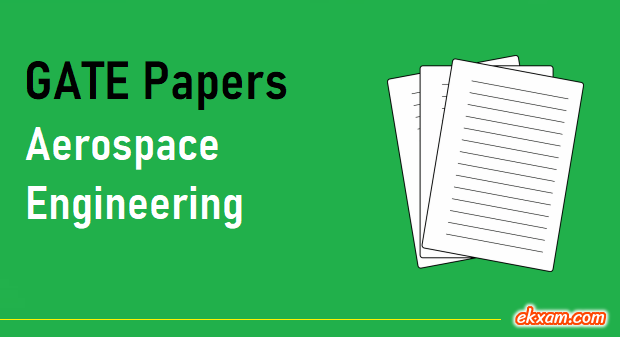Advertisements
Ratings

GATE 2024 DA Preparation – When aspiring to excel in the field of Data Science & Artificial Intelligence (DSAI), acing the Graduate Aptitude Test in Engineering (GATE) is a significant milestone.
This comprehensive guide outlines a step-by-step approach to help you prepare effectively and succeed in the GATE DSAI examination.
Contents
- 1. Introduction to GATE Data Science & Artificial Intelligence
- 2. Understanding the GATE DSAI Syllabus
- 3. Creating a Study Plan
- 4. Choosing the Right Study Resources
- 5. Mastering the Fundamentals
- 6. Practical Implementation and Coding
- 7. Practice with Previous Years’ Question Papers
- 8. Time Management and Mock Tests
- 9. Revision and Conceptual Clarity
- 10. Staying Updated with Current Trends
- 11. Managing Exam Stress
- 12. Final Weeks’ Preparation
- 13. On the Exam Day
- 14. Post-Exam Analysis and Next Steps
- Conclusion
- Additional Resources and References
- GATE Data Science & Artificial Intelligence Guidance
- GATE Data Science & Artificial Intelligence Preparation FAQs
- GATE Total Information & Guidance
1. Introduction to GATE Data Science & Artificial Intelligence
The GATE DSAI examination is a gateway to prestigious institutions and rewarding career opportunities in data science and artificial intelligence.
To ensure success, it’s crucial to strategize your preparation and approach the exam methodically.
2. Understanding the GATE DSAI Syllabus
The GATE DSAI syllabus covers a wide range of topics crucial for a strong foundation in data science and AI. Here’s a breakdown of the syllabus:
Table 1: GATE DSAI Syllabus Breakdown
| Category | Topics |
|---|---|
| Mathematics and Statistics | Probability, Linear Algebra, Statistics |
| Machine Learning | Supervised Learning, Unsupervised Learning, Neural Networks, Decision Trees, Ensemble Methods |
| Artificial Intelligence | Search Algorithms, Logic, Propositional Logic, First-Order Logic |
| Data Science | Data Preprocessing, Exploratory Data Analysis, Feature Selection, Model Evaluation |
| Deep Learning | Convolutional Neural Networks, Recurrent Neural Networks, Transfer Learning |
| Natural Language Processing | Text Classification, Named Entity Recognition, Sentiment Analysis |
| Computer Vision | Image Processing, Feature Extraction, Object Detection |
| Big Data and Analytics | Hadoop, Spark, MapReduce, NoSQL Databases |
3. Creating a Study Plan
A structured study plan is essential for effective preparation. Allocate time to each subject and topic according to your proficiency level and importance.
Table 2: Sample Study Plan
| Week | Subjects/Topics | Time Allocation |
|---|---|---|
| 1-2 | Mathematics & Stats | 10 hours/week |
| 3-4 | Machine Learning | 15 hours/week |
| 5-6 | Artificial Intelligence | 10 hours/week |
| 7-8 | Data Science | 12 hours/week |
| 9-10 | Deep Learning | 15 hours/week |
| 11-12 | NLP, Computer Vision | 10 hours/week |
| 13-14 | Big Data and Analytics | 8 hours/week |
4. Choosing the Right Study Resources
Selecting the right study materials is crucial for effective learning. Here are some recommended resources:
Table 3: Recommended Study Resources
| Subject/Topic | Books | Online Courses |
|---|---|---|
| Mathematics & Stats | “Introduction to Probability” by Blitzstein & Hwang | Coursera’s “Probability and Statistics” |
| Machine Learning | “Pattern Recognition and Machine Learning” by Bishop | Coursera’s “Machine Learning” by Andrew Ng |
| Artificial Intelligence | “Artificial Intelligence: A Modern Approach” by Russell & Norvig | edX’s “AI: Principles and Practices” |
| Data Science | “Python for Data Analysis” by Wes McKinney | edX’s “Data Science MicroMasters” |
| Deep Learning | “Deep Learning” by Goodfellow, Bengio & Courville | Coursera’s “Deep Learning Specialization” |
| Natural Language Processing | “Speech and Language Processing” by Jurafsky & Martin | Coursera’s “Natural Language Processing” |
| Computer Vision | “Computer Vision: Algorithms and Applications” by Szeliski | edX’s “Computer Vision Basics” |
| Big Data and Analytics | “Big Data: A Revolution That Will Transform How We Live, Work, and Think” by Mayer-Schönberger & Cukier | Coursera’s “Big Data Specialization” |
5. Mastering the Fundamentals
Solidify your understanding of the fundamentals in each subject area:
Table 4: Mastering the Fundamentals
| Subject/Topic | Key Concepts |
|---|---|
| Mathematics & Stats | Probability distributions, Matrix operations, Hypothesis testing |
| Machine Learning | Regression, Classification, Clustering, Feature Engineering |
| Artificial Intelligence | Search algorithms, Logic gates, Knowledge representation |
| Data Science | Data cleaning, Exploratory data analysis, Data visualization |
| Deep Learning | Neural network architecture, Activation functions, Backpropagation |
| Natural Language Processing | Tokenization, Part-of-speech tagging, Named entity recognition |
| Computer Vision | Image filtering, Feature extraction, Object detection |
| Big Data and Analytics | MapReduce, Spark, Hadoop ecosystem |
6. Practical Implementation and Coding
Hands-on experience is vital. Practice coding and implementing concepts using popular libraries like Python, TensorFlow, and scikit-learn.
Table 5: Practical Implementation and Coding
| Concept/Topic | Coding Practice |
|---|---|
| Machine Learning Algorithms | Implementing classifiers, regressors, clustering algorithms |
| Deep Learning Models | Building neural networks, training models |
| Data Analysis Techniques | Data preprocessing, Exploratory Data Analysis |
| NLP and Text Processing | Tokenization, Sentiment analysis, Named entity recognition |
| Computer Vision Tasks | Image processing, Object detection, Image classification |
7. Practice with Previous Years’ Question Papers
Solving previous years’ question papers helps you understand the exam pattern and improve time management skills.
Table 6: Benefits of Solving Previous Years’ Papers
| Benefit | Description |
|---|---|
| Understand Question Types | Identify recurring question patterns |
| Time Management | Practice completing the paper within time |
| Exam Pattern Familiarity | Get comfortable with GATE DSAI’s question format |
| Self-Assessment | Gauge your preparation level and identify gaps |
8. Time Management and Mock Tests
Managing time during the exam is crucial. Take mock tests to simulate real exam conditions and improve time management.
Table 7: Benefits of Taking Mock Tests
| Benefit | Description |
|---|---|
| Exam Simulation | Experience the actual exam environment |
| Time Management Improvement | Practice allocating time to different sections |
| Confidence Building | Boost your confidence before the actual exam |
| Identifying Weak Areas | Recognize areas needing further improvement |
9. Revision and Conceptual Clarity
Regular revision is essential for retaining the vast amount of information you’ll be studying.
However, it’s not just about memorizing; focus on understanding the concepts deeply. Here’s how you can approach revision:
- Review your notes and study materials regularly.
- Create summary sheets or mind maps for each topic to reinforce understanding.
- Solve practice questions and problems to apply the concepts you’ve learned.
- Teach the concepts to someone else – this can help solidify your understanding.
10. Staying Updated with Current Trends
The field of data science and artificial intelligence is rapidly evolving. Staying updated with the latest trends, techniques, and research is crucial for GATE DSAI preparation:
- Follow reputable online platforms, research papers, and journals for recent developments.
- Participate in webinars, conferences, and workshops to learn from experts in the field.
- Engage with online communities and forums to discuss emerging trends and share insights.
11. Managing Exam Stress
Exam stress is natural, but effective stress management techniques can help you stay focused and calm:
- Practice mindfulness and meditation to reduce anxiety.
- Maintain a balanced study routine to prevent burnout.
- Get regular exercise, eat healthily, and ensure adequate sleep.
- Visualize yourself succeeding in the exam to boost confidence.
12. Final Weeks’ Preparation
The final weeks leading up to the exam are critical. Here’s how to make the most of them:
- Review your study plan and focus on revision.
- Prioritize topics that you find challenging or haven’t covered thoroughly.
- Take more mock tests to fine-tune your time management skills.
- Avoid starting new topics; instead, consolidate what you’ve learned.
13. On the Exam Day
The big day has arrived! Your preparation efforts will pay off if you manage the exam effectively:
- Read instructions carefully and understand the exam pattern.
- Allocate time to each section based on the number of questions and difficulty.
- Start with questions you’re confident about to build momentum.
- Manage time wisely to attempt all questions within the allocated time.
14. Post-Exam Analysis and Next Steps
Once the exam is over, take time to reflect on your performance:
- Analyze which sections or topics went well and which ones were challenging.
- Identify any mistakes you made and learn from them for future reference.
- Avoid discussing the exam with peers immediately after, as it can create unnecessary stress.
Based on your performance and aspirations, plan your next steps:
- If you’re satisfied with your performance, focus on your next academic or career move.
- If you feel there’s room for improvement, consider preparing for another attempt or explore alternate career paths.
Conclusion
The journey to preparing for the GATE Data Science & Artificial Intelligence exam is an intense but rewarding one.
By following this comprehensive guide, you’ll be equipped with the knowledge, strategies, and techniques to excel in the exam.
Remember that consistent effort, effective time management, and a clear understanding of core concepts are the keys to success.
Additional Resources and References
For more resources and references related to GATE DSAI preparation, refer to the recommended books, online courses, and practice tests mentioned in this guide.
Staying connected with the evolving field of data science and artificial intelligence through reputable sources is also crucial for continuous learning and growth.
GATE Data Science & Artificial Intelligence Guidance
- GATE DA Books 2025: Data Science & Artificial Intelligence
- How to Prepare for GATE Data Science & Artificial Intelligence: A Comprehensive Guide
- GATE DA Syllabus 2025: Data Science & Artificial Intelligence
GATE Data Science & Artificial Intelligence Preparation FAQs
What is GATE Data Science & Artificial Intelligence (DS & AI)?
GATE DS & AI is an examination conducted by the Indian Institute of Technology (IIT) for admission into postgraduate programs in the field of Data Science and Artificial Intelligence.
It evaluates candidates' knowledge and aptitude in these domains and serves as a gateway to pursue higher education in this rapidly evolving field.
What are the important subjects to focus on for GATE DS & AI preparation?
Key subjects to focus on include machine learning, data science, artificial intelligence, statistics, linear algebra, programming languages like Python or R, and algorithms.
It's crucial to refer to the official GATE syllabus for DS & AI to ensure comprehensive coverage.
How should I prepare for the GATE DS & AI exam?
To prepare effectively, start by creating a study plan based on the GATE syllabus.
Use standard textbooks and online resources for each subject, and practice solving previous years' question papers.
Joining a coaching institute or online courses can also provide structured guidance. Consistent practice, revision, and mock tests are essential for success.
Are there any recommended books or resources for GATE DS & AI preparation?
Yes, some recommended books and resources include:
- 'Pattern Recognition and Machine Learning' by Christopher M. Bishop
- 'Introduction to Data Science' by Jeffrey Stanton
- 'Artificial Intelligence: A Modern Approach' by Stuart Russell and Peter Norvig
- Online courses from platforms like Coursera, edX, and NPTEL.
What is the exam pattern for GATE DS & AI, and how should I approach it?
GATE DS & AI consists of multiple-choice questions, multiple-select questions, and numerical answer type questions.
It typically covers a variety of topics, including theoretical concepts and practical applications.
Start by attempting questions you are confident about and manage your time wisely.
Don't hesitate to skip challenging questions and return to them later.
Accuracy and a clear understanding of concepts are crucial for success.
Recent Posts
- AAI Through GATE 2024 – JE (Junior Executive)
- M Tech and MS Programs Through GATE and GRE: Navigating Postgraduate Options
- Job Opportunities After GATE 2024 in India: What You Didn’t Know!
- BSPHCL Through GATE 2024 – 40 AEE
Related Tags
How to prepare for gate data science pdf, How to prepare for gate data science reddit, how to prepare for gate data science and ai, gate data science and ai syllabus, gate data science and ai syllabus pdf, gate data science and ai eligibility, gate 2024 data science and ai sample paper, gate data science and ai books
| GATE (Reasoning & Aptitude & Maths) Books |
| GATE Guide Books |
GATE Total Information & Guidance
Click below given links to get further information.







